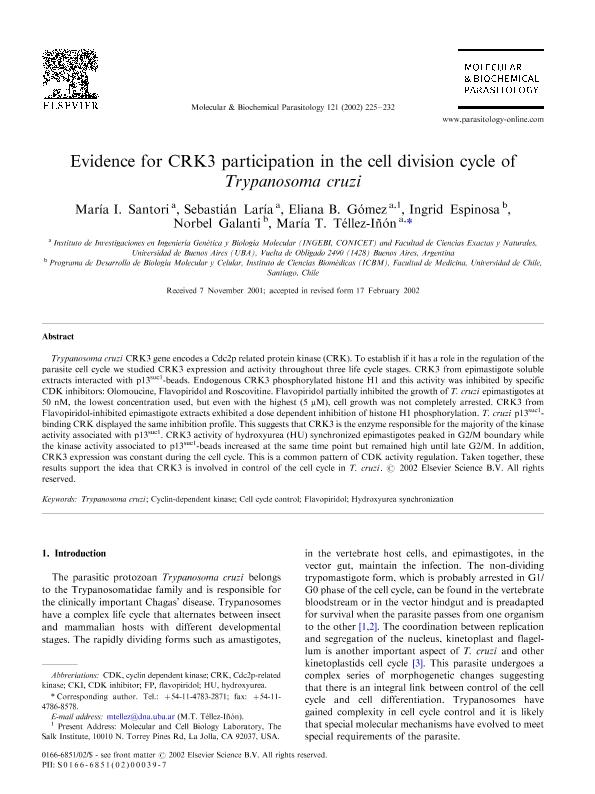Artículo
Evidence for CRK3 participation in the cell division cycle of Trypanosoma cruzi
Santori, Maria I.; Laría, Sebastián; Gomez, Eliana B.; Espinosa, Ingrid; Galanti, Norbel; Tellez, Maria Teresa

Fecha de publicación:
12/2002
Editorial:
Elsevier Science
Revista:
Molecular and Biochemical Parasitology
ISSN:
0166-6851
Idioma:
Inglés
Tipo de recurso:
Artículo publicado
Clasificación temática:
Resumen
Trypanosoma cruzi CRK3 gene encodes a Cdc2p related protein kinase (CRK). To establish if it has a role in the regulation of the parasite cell cycle we studied CRK3 expression and activity throughout three life cycle stages. CRK3 from epimastigote soluble extracts interacted with p13suc1-beads. Endogenous CRK3 phosphorylated histone H1 and this activity was inhibited by specific CDK inhibitors: Olomoucine, Flavopiridol and Roscovitine. Flavopiridol partially inhibited the growth of T. cruzi epimastigotes at 50 nM, the lowest concentration used, but even with the highest (5 μM), cell growth was not completely arrested. CRK3 from Flavopiridol-inhibited epimastigote extracts exhibited a dose dependent inhibition of histone H1 phosphorylation. T. cruzi p13suc1-binding CRK displayed the same inhibition profile. This suggests that CRK3 is the enzyme responsible for the majority of the kinase activity associated with p13suc1. CRK3 activity of hydroxyurea (HU) synchronized epimastigotes peaked in G2/M boundary while the kinase activity associated to p13suc1-beads increased at the same time point but remained high until late G2/M. In addition, CRK3 expression was constant during the cell cycle. This is a common pattern of CDK activity regulation. Taken together, these results support the idea that CRK3 is involved in control of the cell cycle in T. cruzi.
Archivos asociados
Licencia
Identificadores
Colecciones
Articulos(INGEBI)
Articulos de INST.DE INVEST.EN ING.GENETICA Y BIOL.MOLECULAR "DR. HECTOR N TORRES"
Articulos de INST.DE INVEST.EN ING.GENETICA Y BIOL.MOLECULAR "DR. HECTOR N TORRES"
Citación
Santori, Maria I.; Laría, Sebastián; Gomez, Eliana B.; Espinosa, Ingrid; Galanti, Norbel; et al.; Evidence for CRK3 participation in the cell division cycle of Trypanosoma cruzi; Elsevier Science; Molecular and Biochemical Parasitology; 121; 2; 12-2002; 225-232
Compartir
Altmétricas



